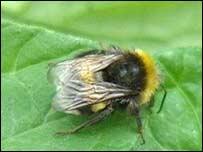Setback for bumblebee project at RSPB Dungeness reserve
- Published

Bumblebees are key to pollinating important crops
An attempt to bring a species of bumblebee back from New Zealand to the UK has failed after many of the insects died during hibernation.
Last year Natural England and other conservation groups launched a bid to reintroduce the short-haired bumblebee at a reserve in Dungeness, Kent.
The species was last seen in the UK in 1988, but populations on the other side of the world have survived.
Project officer Dr Nikki Gammans said it was disappointing.
Dr Gammans, from the Bumblebee Conservation Trust, said: "Unfortunately, we had to give them a different pollen source at the beginning and we think possibly that delayed them quite a bit, possibly by even a month.
"So they were already quite behind by the time they started to lay eggs and we think that's probably why we didn't get quite as many queens coming through.
"Then obviously when we put them in hibernation, we didn't have as many as we'd hoped for, and hibernation is always quite a risky time."
She added: "We're disappointed for this year, but next year we're going for it, so fingers crossed."
'Keystone species'
The short-haired bumblebee was exported from the UK to New Zealand on the first refrigerated lamb boats in the late 19th Century to pollinate clover crops.
Plans to bring them back to the UK involved collecting bees in New Zealand and flying them back in cool boxes during hibernation.
The partnership project is being run by Natural England, the Bumblebee Conservation Trust, the RSPB and Hymettus.
When the scheme was launched, Dr Gammans said the bee was a "keystone species" which was key to pollinating about 80% of important crops.
Bob Gomes, from the RSPB which runs the Dungeness reserve, said the charity had prepared a good habitat for the bees by planting clover and vetch and keeping animals off the land so the vegetation could flower and re-seed.